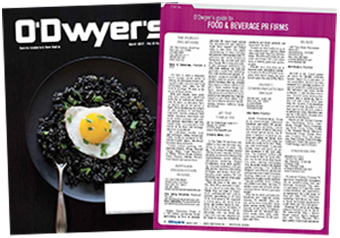 Atalanta Rafferty Atalanta Rafferty |
Research on Millennials consistently points to their interests in sustainability, purpose and corporate social responsibility, and the impact these issues have on their purchase habits across the supermarket and in restaurants.
While food companies — big and small — have made great strides in being transparent about how their food is made, the ingredients they use and their commitment to responsible sourcing, it has done little to move the needle with it comes to product purchase.
|
|
Those of us who have worked in the food industry for years know that taste and convenience are still paramount when purchasing food. But with changing taste preferences, improvements in product development, new technologies and heightened social awareness can we finally anticipate a change in consumer behavior?
As we began 2017, we’ve seen a considerable shift in both personal and professional activist behavior in the United States. The rise of personal activism as well as demands for greater action, involvement and industry activism have created a new environment in which food and beverage companies must operate.
Increasingly, consumers are boycotting or supporting brands that stand for their shared values. The Super Bowl ads alone clearly showed that companies are taking a greater involvement in broader societal issues than before.
This is transpiring to the foods and beverages we consume. Consumers are thinking twice about the environmental, social and economic impact their personal decisions can have. And this isn’t just among Millennial consumers; we are seeing this resonate across generations, with a desire to be part of the solution.
In addition, we continue to see an evolution in taste preference and food culture. Ethnic flavors, plant-based foods, alternative sources of protein and real, simple ingredients are driving consumer demand.
In the past two months alone, plant-based foods have garnered 77,000 mentions on social media and alternative proteins have garnered 26,000 mentions in the same time period. And the food industry is responding to these demands with new offerings and reformulations of established products that are transforming the food and beverage space.
Critical to this movement is new technology and innovation that deliver on the promise of great taste and superior nutrition, while minimizing the environmental impact of the foods we eat. Our food systems are increasingly under pressure, be it the water used and food wasted during production, the overfishing of our oceans or the decreasing nutritional value of our foods.
Increasingly, innovative food companies are stepping up to the plate. Meat alternative companies like Impossible Foods, food industry innovator TerraVia — with its portfolio of algae products — snack companies like Barnana and beverage manufacturers like Fairlife are at the intersection of sustainability, taste and nutrition and are driving this new food movement forward.
And while these companies are still in the early years of development and consumer adoption, we’re all rooting for their success and the advent of many more who can bring about changes in how and what we eat and drink.
We expect to see more consumer demand — and great things to come — from the industry in 2017.
* * *
Atalanta Rafferty is Executive Managing Director at RF|Binder.



 What the biggest meal of the day can teach us about serving up effective nutrition communications campaigns.
What the biggest meal of the day can teach us about serving up effective nutrition communications campaigns. Tips to refine and amplify your CPG brand strategy to win in 2024 and beyond.
Tips to refine and amplify your CPG brand strategy to win in 2024 and beyond. Strategic communications strategies for success in the growing “food is medicine” movement.
Strategic communications strategies for success in the growing “food is medicine” movement. How brands can authentically communicate sustainability issues and create a brand experience that’s compatible with consumers’ values.
How brands can authentically communicate sustainability issues and create a brand experience that’s compatible with consumers’ values. Communicating the effects that climate change and a growing world population have on our food system—and why change is needed.
Communicating the effects that climate change and a growing world population have on our food system—and why change is needed.


 Have a comment? Send it to
Have a comment? Send it to 
No comments have been submitted for this story yet.